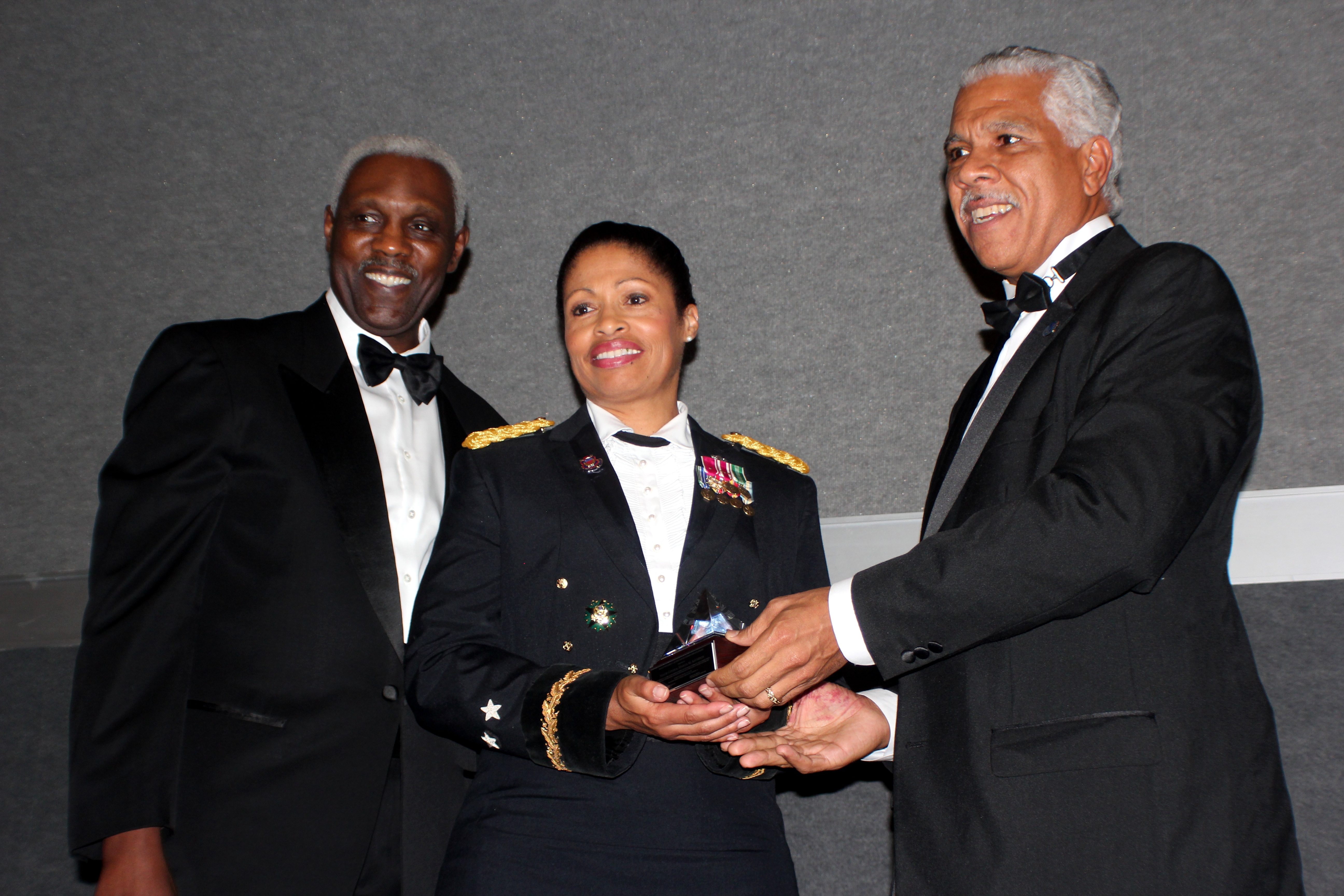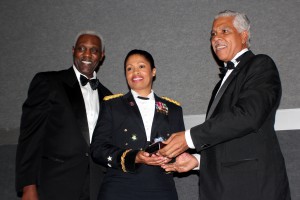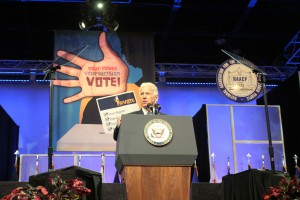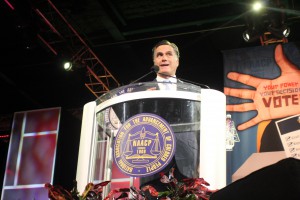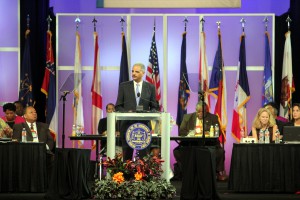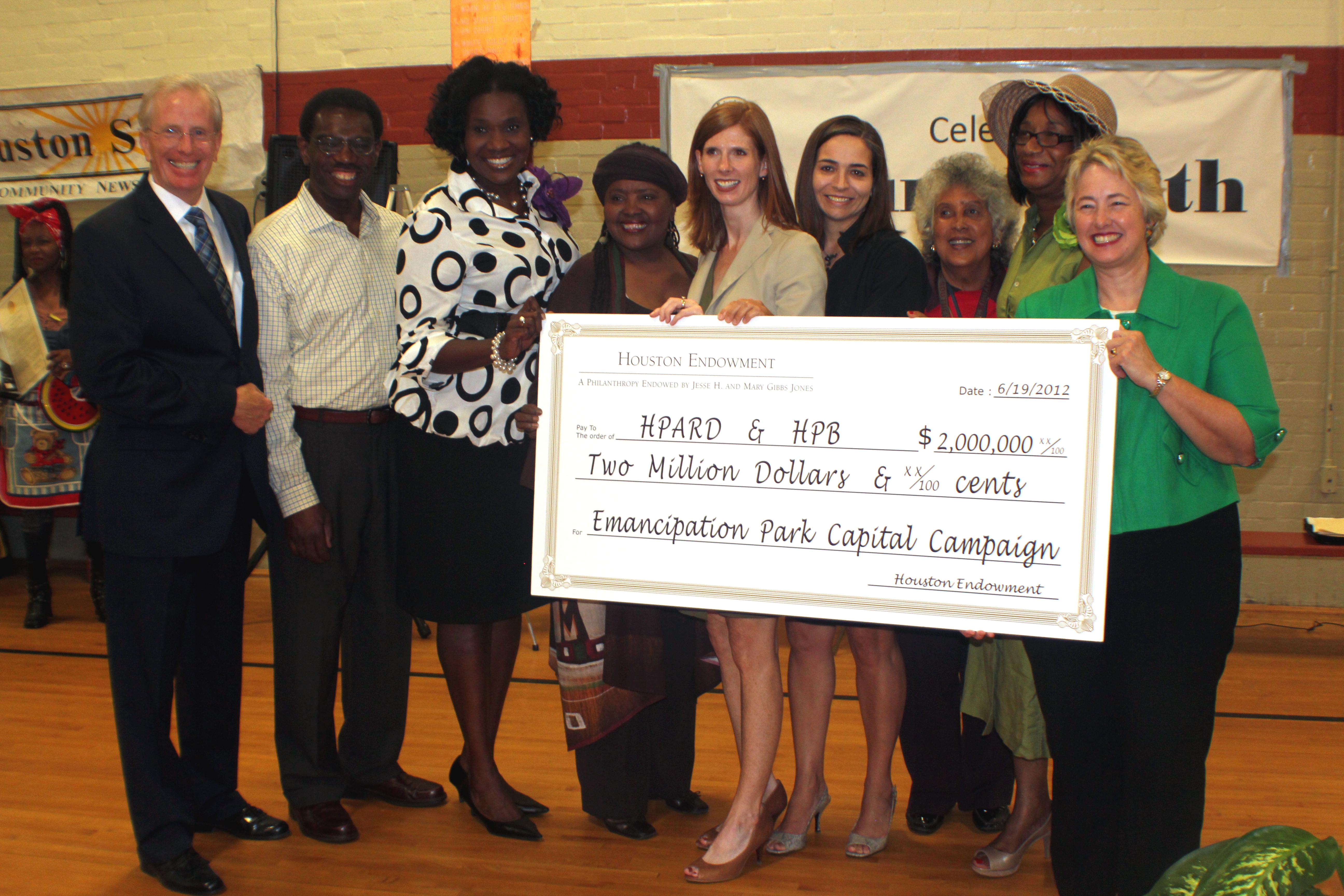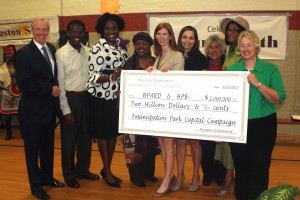The Houston Ministers Against Crime held a faith based health ministry initiative training conference September 21, 2012 at the Third Ward Multi-Purpose Center promoting wellness and recovery for the community in various areas of health related issues.
Reverend Carl Matthews and Dr. Robert McKinley Gilmore hosted the health seminar bringing in a variety of organizations to teach and guide community leaders and members in the plight to build a healthy community. Organizations such as the Texas Health Institute (Benefit Banking), American Diabetes Association, Health and Human Services and the National Association Mental Institute all gave presentations about awareness, prevention and recovery.
“I brought this conference together to help empower pastors to create innovative approaches to dis-proportionality and health disparities,” Rev. Matthews said. “I realize that our communities suffer in many areas of illnesses such as chronic diseases, heart attack, stroke, hyper-tension, obesity, diabetes etc., and my message to the church is that the message doesn’t change but the methods must change. We must coordinate a community with appropriate partnerships so we can create a community that has access to health care.”
The CEO of Texas Health Institute, Camille Miller, did a co-presentation with their State Director and former State Representative, Diana Maldonado about the Benefit Bank of Texas. This program is a web based portal and counselor assisted program that helps low to moderate income individuals connect with support and benefits. The Benefit Bank serves as a tool to support workers, stabilize families and strengthen communities through programs such as SNAP (food stamps), Medicaid, Temporary Assistance for Needy Families (TANF), Federal Taxes, Free Application for Federal Student Aid (FAFSA), Voter Registration and Veteran’s Education(November 2012).
“The Texas Benefit Bank served as a refresher course for the workers in the community,” said Carolyn DeVaughn, Manager of Outreach, Children Defense Fund. “If the ministers could get their congregations to just put their information online it would be such a help. The older generations don’t really trust in doing that but it would be helpful if we could get our community to get involved and just trust it.”
Jennifer Williams of the American Diabetes Association followed the Benefit Bank presentation. Williams educated the audience on one of the most debilitating diseases that plague the African-American community, diabetes. Discussion followed on how to have power over diabetes, education on the symptoms, prevention and how to fight to survive diabetes through wellness and recovery.
The National Association Mental Institute (NAMI) informed attendees of the many mental illnesses that disrupt the promise of a happy life in many because of misdiagnosis, stigma, and fear. Rev. Gary Eagleton and Program Director, Angelina Hudson, spoke on the platform that mental illness is real, diagnosis is necessary for appropriate treatment and recovery is possible. Attention Deficit Disorder(ADD), Attention Deficit Hyper Activity Disorder(ADHD), Autism and Bi-Polar Disorder were all explored and personal stories revealed to give light on how it affects communities and families.
The State of Texas Health and Human Resources also delved into the community and family aspect as Mia Williams represented them under the umbrella of dis-proportionality and disparities. Williams drilled the audience on subjects such as why people are poor, and why young Black and Hispanic children are coming into the system faster and staying longer. Education, health, location, and assistance became the target for review. Williams urged the audience to open their minds and put away their biases to find a solution to help out their communities while pointing out why many minorities suffer from certain diseases, financial and educational problems.
Judge Michael Schneider of the 315 District Juvenile Court and Henry Gonzales, the Assistant Executive Director of the Harris County Juvenile Probation Department, spoke in conjunction about families, drug usage amongst juveniles and support systems that bridge between families and the courts. Both informed the crowd that the solutions they are seeking do not involve locking up the youth but finding alternatives such as community services that make the youth become involved in their community. Therapy services is offered to families and are even set up to where the counselors will come out to the home to service the family if they do not have transportation, which is a major issue for many Houstonians. The latest innovations in drug court for juveniles was also presented to the audience as well as the rationality of Judge Schneider, who emphatically expressed that he does not want to lock up the youth but rehabilitate them in their home setting and not just the child but the family around them as well.
The last presenter was First Priority. This organizations purpose is to keep Houstonians in health, body and mind. With the access to clinics and community services communities can flourish. First Priority gave the information for community leaders to spread the word about where people can access the information to find these services. Healthy food, low income clinics, and community centers in your area are accessible through their website www.firstpriorityhouston.org.
These health based initiative seminars will be a monthly re-occurring event. It is mobile and will be in different churches and community centers. It will go on until December and will start again in January.
###
First African American woman Major General for the Army
Major General Marcia M. Anderson was honored with the Benjamin L. Hooks Distinguished Service award Tuesday night at the National Association for the Advancement of Colored People’s, (NAACP) Armed Services & Veterans Affairs Dinner at the Grand Ballroom of the George R. Brown Convention Center.
A St. Louis native, Anderson became the first African American woman to earn the rank of Major General in the United States Army Reserve.
“I’m very proud to receive this award and I’m going to use this award to continue my upmost to make the [military] organization that I love very much to move forward,” said Anderson.“ I still have much to do.”
One of Anderson’s goals is to increase diversity within the military which has dropped across the board for all minorities.
“It’s extremely important that you demand that an institution as large and powerful as the military represent the diversity as our nation,” Anderson said. “If the military does not reflect its people, then things can happen in our democracy, and I’d had for that to happen to this country.”
According to Anderson, the reason for the lack of diversity within the military possibly streams from the experience many Americans had during the Vietnam War.
“Unfortunately older members of our community still do not trust or believe in diversity or that they have the best interest of soldiers,” explained Anderson who sees herself as the perfect example of what diversity in the military can achieve. “I’m trying to combat that and let people know that it’s not a perfect organization, but there are sincere efforts to remedy that.”
This is where the military goals line up with the NAACP according to Anderson.
“Just as with the NAACP; we strive to have people in the service to be judged on the content of their character, rather than the color of their skin,” Anderson said.
U. S. Supreme Court immigration ruling brings civil rights
<strong>Laci K. Ollison
The Houston Sun</strong>
Implications of Supreme Court’s Ruling on Immigration Law leaves many with questions. Civil Rights Groups to assist Latino community with information.
On June twenty-fifth, the Sup
reme Court struck down three sections of the Arizona law that cracks down on illegal immigration. However, the law’s most controversial element, better known as the “show me your papers” provision remains intact.
Arizona Senate Bill 1070 (known more commonly as just SB 1070) contains 14 sections and dozens of subsections, but only two full sections and two subsections were blocked by a judge shortly before it went into effect in July 2010. Here is a brief summary of what the Supreme Court decided:
• Section 2B (upheld): This part of the bill says state and local law enforcement officers in Arizona are authorized to determine the immigration status of anyone they reasonably suspect might be in the United States illegally. Forms of identification suggested by the bill include an Arizona driver’s license, Arizona ID card, tribal enrollment card or other official ID issued by a US federal, state or local government.
• Section 3 (struck down): This section would have made it a state crime for undocumented immigrants not to carry an alien registration document. The ruling claimed this merely reiterated federal law, and as such was superseded.
• Section 5C (struck down): This section would have made it a state crime for undocumented immigrants to look for a job or perform work in Arizona.
• Section 6 (struck down): This part of the bill would have allowed a state or local police officer to conduct an arrest without a warrant when police have probable cause to believe an individual committed a felony, a misdemeanor or a crime that would make them removable from the United States.
Leaders of Houston United and Pastor’s In Action, two civil rights groups, gathered on July 6th for a press conference.
“These are broad sweeping implications here, and when this law got put before the Supreme Court, we all sat wondering what this will mean,” says Mike Espinoza from Houston United. “Will the courts make sure that police can’t ask us for our papers just because of the color of our skin, or will this open season on immigrants? So, these are part of the questions that everybody is in their homes facing.”
Espinoza says they have an open dialogue with the Houston Police Department. However he admits they’re working on one with the Harris County Sheriff’s Department. He also says they don’t see eye to eye because of its support of the 287G program, the federal law that partner’s law enforcement with ICE, Immigration and Customs Enforcement, to intercept, interview and detain foreigners suspected of being in this country illegally.
Houston United and Pastor’s In Action partnered together to produce a forum in hopes of educating the Latino community on exactly what this law means.
Gerardo Cardenas with National Church ID, a member of Pastors in Action, says they want to clarify what the letter of the law states.
“Our people are afraid of being racially profiled,” Cardenas says. “What we don’t want to happen is for law enforcement to think that we are illegal just because we look Hispanic.”
“The population of Latino’s in Harris County alone is greater than the population of the state of Colorado,” says Espinoza.
According to the 2011 Harris County Census, the population of people of Hispanic or Latino origin is 41.4% of the total population.
<strong>Spanish Version</strong>
Implicaciones de la Sentencia del Tribunal Supremo sobre la Ley de Inmigración deja preguntas sin respuesta. Grupos de derechos civiles para ayudar a la comunidad latina con información.
En junio de 25o, la Corte Suprema anuló tres secciones de la ley de Arizona que reprime la inmigración ilegal. Sin embargo, el elemento más controvertido de la ley, más conocida como la “muéstrame tus papeles” disposición se mantiene intacta.
Arizona, la SB 1070 (más conocido simplemente como la SB 1070) contiene 14 secciones y docenas de subdivisiones, pero sólo dos secciones completas y subsecciones dos fueron bloqueados por un juez poco antes de que entró en vigor en julio de 2010. Aquí está un breve resumen de lo que la Corte Suprema de Justicia decidió:
• Sección 2B (confirmada): Esta parte del proyecto de ley dice que los agentes del orden locales y estatales de aplicación en Arizona está autorizado a determinar el estatus migratorio de cualquier persona que razonablemente sospeche que pudiera estar en los Estados Unidos de manera ilegal. Formas de identificación sugeridas por el proyecto de ley incluye una licencia de conducir de Arizona, Arizona, tarjeta de identificación, tarjeta de inscripción tribal u otra identificación oficial emitida por un federal de los EE.UU., gobierno estatal o local.
• Sección 3 (abatido): En este apartado se han convertido en un crimen de Estado para los inmigrantes indocumentados no llevan a un documento de registro de extranjero. El gobernante afirmó que esta se limitó a reiterar la ley federal, y como tal fue reemplazado.
• En la sección 5C (abatido): En este apartado se han convertido en un crimen de Estado para los inmigrantes indocumentados para buscar un trabajo o realizar un trabajo en Arizona.
• La sección 6 (abatido): Esta parte del proyecto de ley habría permitido a un oficial de policía local o estatal para llevar a cabo una detención sin orden judicial cuando la policía tiene causa probable para creer que una persona ha cometido un delito grave, un delito menor o un delito que haría ellos extraíble de los Estados Unidos.
Los líderes de Houston Unidos y del pastor en Acción, dos grupos de derechos civiles, se reunieron el 6 de julio para una conferencia de prensa.
“Estos son amplias implicaciones radicales aquí, y cuando esta ley he puesto ante la Corte Suprema, nos sentamos todos preguntándose qué significará esto”, dice Mike Espinoza de Houston Unidos. “Serán los tribunales de asegurarse de que la policía no puede pedirnos nuestros trabajos sólo por el color de nuestra piel, o la voluntad de esta temporada abierta a los inmigrantes? Así pues, éstos son parte de las preguntas que todo el mundo está en sus casas que se enfrentan. ”
Espinoza dice que tienen un diálogo abierto con el Departamento de Policía de Houston. Sin embargo, admite que están trabajando en una con el Departamento del Sheriff del Condado de Harris. También dice que no ve a los ojos a causa de su apoyo al programa 287G, la ley federal que la aplicación de la ley pareja con el ICE, Inmigración y Aduanas, para interceptar, entrevista y detener a extranjeros sospechosos de estar ilegalmente en el país.
Houston Unidos y del pastor en Acción se unieron para producir un foro con la esperanza de educar a la comunidad latina sobre exactamente lo que significa esta ley.
Gerardo Cárdenas con la Iglesia Nacional de identidad, un miembro de los Pastores en Acción, dice que quiere aclarar lo que la letra de la ley establece.
“Nuestra gente tiene miedo de ser perfil racial”, dice Cárdenas. “Lo que no queremos que ocurra es que la policía a pensar que son ilegales sólo porque nos fijamos hispana”.
“La población de los latinos en el Condado de Harris por sí sola es mayor que la población del estado de Colorado”, dice Espinoza.
De acuerdo con el Censo 2011 del Condado de Harris, la población de personas de origen hispano o latino es del 41,4% de la población total.
Craig Watkins speaks at NAACP luncheon
image-249″ />
Dallas County District Attorney Craig Watkins was the keynote speaker for the NAACP’s Clarence M. Mitchell, Jr. Memorial Luncheon last Monday noon at the downtown Hilton Hotel Americas Ballroom.
A graduate of Prairie View A&M University and Texas Wesleyan University School of Law, Watkins made history in 2007 as the first African-American elected to the position of Criminal District Attorney in Texas.
Watkins told attendees that graduating from an HBCU as a political science major, learning the history of civil rights and having an uncle who was a member of the NAACP gave him a different perspective on many issues when he was elected.
One of the most important abilities that Watkins reminded the luncheon attendees that he had was his subpoena power.
“I choose who will come before a jury or a judge to state their case of a crime they may or may not have committed,” said Watkins. “It’s powerful.”
Watkins mentioned the importance of subpoena power to hone in the importance of having more minorities in the DA position since African American incarceration rate and execution rate are disproportionately high.
“I do realize as a person of color that in Texas and every other state in this country we have disproportionately used capitol punishment to execute people of color to seek justice and sometimes we have done it when they didn’t deserve it,” said Watkins.
Though he was never asked his position on capitol punishment in the United States, his opinion changed after seeing his first execution five years into being DA and realizing that a large number of the inmates in the holding chamber were African American.
According to Watkins, the high incarceration rate for African American men is systematic through the underlying correlation between crime and lack of education.
“There’s nothing wrong with people that look like me but the system,” said Watkins. “Those folks that I send to prison for crimes they actually committed are because they’re not educated.”
Attending the prestigious luncheon included civil rights activist Julian Bond, Tx Rep. Ron Reynolds (D-Dist. 27) and Texas Congressmen Al Green.
Biden rouse the NAACP delegates at 103rd convention
Sheila Ray-Reed
The Houston Sun
Following a video presentation by President Barack Obama to the NAACP’s Final Plenary Session with his central theme being that in America you can make it if you try, regardless of who you are, what you look like and where you come from. “That is why we fought so hard for good jobs, a quality education, and a justice system that treats everybody fairly. That’s why we made health care reform a reality. That is why we are still fighting so hard today to build an economy so that everyone can have the confidence that their hard work will pay off. That is why as long as I have the honor to serve as your president, I will get up every single day and fight as hard as I can. That’s my promise to you, if you stand with me,” he said.
Vice President Joe Biden came out swinging complementing the President’s promise by first drawing a distinct difference between Mitt’s Romney’s agenda who addressed the Civil Rights organization a day before.
“I think Mitt Romney is a fine family man. I believe that he’s driven by what he believes. But the differences are so basic about how we view the future of America.” said the vice president.
Biden said the former Massachusetts governor’s agenda would hurt black working families as he outlined the differences. “We see early childhood education as the single most important criteria for minority children. Education does not play a role with Romney and the republican regime. They have it on the back burner. Just look at the budget cuts in early childhood education.” he said
Biden continued, and pointed out the hypocrisy of Romney’s educational ideas, “Romney says that decreasing classroom sizes for children could be harmful. Well, just take a look at the sizes of classes in those private schools,” said the vice president with sarcasm.
Other distinct differences were Romney opposing government for the development of renewable energy sources and efforts to equalized pay between men and women.
The Vice President enlightened and reminded the crowd that the Republicans of today are a far cry from the ones back in the day. “I didn’t think we would be back. I remember working with Republicans. And by the way, this ain’t your father’s Republican Party. I remember working with Republicans on motor-voter, on expanding the franchise on early voting, on voting by mail. Some of these were Republican ideas. But this is not the Republican Party here today, nor Romney’s,” he said.
The Vice President drew cheers as he credited the President for championing a landmark health care law, launching the mission that killed Osama bin Laden and stepping in to rescue the financial system and General Motors and Chrysler. “The Presidency is about character. It is about putting your country first. From the very moment, President Obama put his hand on that Bible that cold day in January, he has always put county first. I have watched him make some of the toughest decisions any President has had to make since Franklin Roosevelt. He save the nation’s financial system and stood up for the automobile industry even though it was not a popular decision,” said Biden.
He reminded the attendees that the very reason for the existence of the NAACP and at its core; is the right to vote. “Remember when you have the right to vote, you have the right to change things! And we, the President and I, and Eric, and all of us see those rights expanded and not diminished,” he said referring to Romney and the Republican’s agenda.
In closing, the Vice President offered a warning and asked the attendees to close their eyes and imagined what a Romney presidency would bring to civil rights.
“Let me close my friends, by saying. Imagine that the senior advisor on Constitutional Issues would be Robert Bork. Imagine on the recommendation of Attorney General and head of Civil Rights Division who would likely to be pick. Imagine what the Supreme Court would look like after four years of a Romney presidency,” he said.
He continued, “Folks this election in my view is at the heart and soul of America. These guys had a total different fundamental view. The President and I and you see America as in the eyes of the Scripture, ‘What you do to the least of my brothers; You do to me,’” concluded the Vice President.
Bork was appointed by President Ronald Reagan in 1987 for the Supreme Court but his nomination was defeated by Democrats. Biden was chairman of the Senate Judiciary Committee at the time.
Mitt Romney appeals to blacks
Republican presidential nominee Mitt Romney attempted to appeal his platform to African American voters during Wednesday morning’s the 103 National Association for the Advancement of Colored People (NAACP) Convention plenary session at the George R Brown Convention Center.
Many attendees of the convention like Athans, Ala. representative for the NAACP Wilbert Woodruff were skeptical of Romney’s appearance but were optimistic for a candidate who runs for a party that many African Americans feel have not had their best interest.
“I’m open minded, we’ll listen objectively and take the good and exclude the bad,” Woodruff said. “Well it’s nice that Mr. Romney would come by and speak to the NAACP however, my voter affiliation is Democrat.”
Attendees gave a warm reception to Romney’s goal of restoring the nation’s struggling middle class.
“The president wants to make this campaign about blaming the rich and I want to make this campaign about helping the middle class of America,” said Romney to applause. “ I’m running for president because I know that my policies and visions will help millions of middle-class Americans from all nations.”
Romney would then try to draw support by focusing on the importance of raising a child through a traditional family. Romney mentioned a Brookings Institution study that concluded that those who graduate from high school, get a full-time job and wait until 21 before marriage along with having their first child have a two percent probability of becoming poor while deviating from those probabilities increase the chance by 74 percent.
A message that was clearly geared toward the black audience.
“Any policy that uplifts and honors the family is going to be good for the country and that must be our goal,” said Romney. “I’ll promote strong families and I will defend traditional marriage.”
Those same cheers would turn to jeers when he promised to repeal Obama’s healthcare reform while taking a few jabs at the president incumbent.
“I’ll eliminate every nonessential expensive program I could find; that includes Obamacare,” Romney said quickly before being booed by attendees.
One of the more vocal hecklers was Shirley Smith, who yelled loud enough to be heard across Hall B3 of the convention center.
“Don’t come to us and appease us like we’re so dumb that you can come and say what you want to say to us,” said the 70 year-old Washington D.C. Native. “His speech was condescending.”
Civil Rights activist Julian Bond said that though the NAACP is happy that Romney came, but aren’t satisfied with his message. According to Bond, he feels that Romney made those remarks about Obamacare to show that he’s not afraid to get booed by blacks for saying what he believes.
Bond says that the negative response to Romney’s speech showed blacks’ overwhelming support for Obama.
“It shows that the affection that black America have for Obama but also the affection that they have for Obamacare,” said Bond “They [black America] know it’s a great step forward; they know it’s needed; they know it’s something we have to have and are frightened of someone who says they’ll wipe it off.”
Attorney General Holder calls out Texas voter ID law
Sheila Ray-Reed
The Houston Sun
The 82nd U.S. Attorney General Eric Holder was greeted by rousing chants of support, “Stand your ground! Stand your ground! Stand your ground! By more than 1000 NAACP delegates attending the Delegate Session at the 103rd National Convention in Houston, TX. The Attorney General did not directly address their “stand your ground” call in reference to him standing firm to his recent contempt of Congress charge for improperly withholding documents pertaining to the Operation Fast and Furious, that reportedly landed guns in the hands of Mexican Drug Cartel. Instead he told the delegates it was wonderful to be with them and thanked them for their love. “Let me just say, I love you back NAACP. Thank you all for those kind words and warm welcome. I am going to be very honest; it’s nice to be outside Washington, D.C. And it is also an honor for me to bring greetings from another brother, President Barack Obama,” he said.
Moving into the heart of his presentation, the Attorney General dove fully charged, blasting the Texas Voter’s Identification Law saying that, “Texas is the center of our national debate on voting rights.” He told the delegates that the measure hurts minorities who are less likely to have an ID. “Many of those without IDs would have to travel great distances to get them. And some would struggle to pay for the documents they might need to obtain them. We called these polled taxes,” he said.
He promised an aggressive effort to safeguard voting rights. “The arc of history has always moved toward expanding the electorate. It is what has made this nation exceptional. We will simply not allow this era to be the beginning of the reversal of that historic progress,” he said.
The Obama administration and national civil rights groups such as the NAACP believe that state laws that require people to show government-issued photo IDs at the polls could deny millions of them, mostly minorities and the elderly, who are more likely to lack such IDs the right to vote.
Under Texas’ law, Attorney General Holder noted, a concealed handgun license would served as acceptable ID to vote, but a student ID would not. He went on to say that while only 8 percent of white people do not have government issued IDs, about 25 percent of black people lack such identification.
In March of this year, the Justice Department’s civil rights division objected to photo ID requirements for voters in Texas saying the state did not prove that the bill would not have a discriminatory effect on minority voters. In-turn the Texas attorney general’s office filed suit against U.S. Attorney General Holder and the Department of Justice sending the case to federal court.
Just one day before, the Attorney General’s arrival in Houston, the trial started in federal court in Washington over the 2011 law passed by Texas’ GOP dominated legislature.
A group of representatives from the Texas League of Young Voters Education Fund traveled to Washington to act as plaintiffs in Texas v. Holder, the first Voter ID case to be argued in U.S. District Court. As leaders in the fight to defeat Voter ID for the last year, the Texas League of Young Voters and African-American student organizers from Prairie View A&M University and Texas Southern University are serving as defendant-interveners in the lawsuit, represented by the NAACP Legal Defense Fund.
The case is to be decided in five days by a three-judge panel; Judge Rosemary Collyer, appointed by President George W. Bush, Judge David Tatel, appointed by President Bill Clinton in 1994, and Judge Robert Wilkins, appointed in 2010 by President Barack Obama.
Texas v. Holder could pave the way for legal challenges by other states with Voter ID laws.
Jeep shows off 2013 vehicles at this year’s Free Press Music Fest
The 2012 Free Press Summer Fest(FPSF) gave music loves a little bit of every at Buffalo Bayou’s Eleanor Tinsley Park during the first weekend of June.
FPSF’s biggest automotive sponsor was Jeep, who held their own Jeep Power Amp Experience tent.
The biggest automotive sponsor of the event was Jeep, Power Amp Experience tent which had something a little different than your average promotional booth. In a more interactive way to get potential buyers, the Jeep Power Amp Experience had an obstacle course to show off the new features of the new 2012 Jeep Wrangler through a ride along. Riders who registered experience an the Wrangler’s ability to roll up a hill, drive through water and more.
At the end of the ride along was an obstacle course where attendees could compete against each’s time for prizes.
Also in Jeep’s booth were cooling sections and information on their latest vehicles.
In it’s fourth year, Free Press Summer Fest, featured outstanding performances from the likes of Willie Nelson, Erykah Badu and Snoop Dog on six stages.
Emancipation Park Celebrates Juneteenth
Friends of Emancipation Park(FOEP) began celebrating Juneteenth at the historic park last month.
Festivities kicked off with the annual Mr. & Ms. Juneteenth Pageant which was headed by Mildred Johnson and for the first time in the event’s history, incorporated males.
The Beauty and The Beast Tea featured elegantly designed tables that incorporated one essential message the following Sunday, freedom. Catered food, assorted teas and various desserts were provided.
Monday, children that participated in the Emancipation Park Summer Camp learned about the history of Juneteenth along with making arts and crafts that reflected their heritage.
Watermelon and red punch were given to children following Wednesday’s talent show which featured young competitors from various parks around Houston. Children danced, and sung for audiences as well as judges.
More activities for FOEP’s Juneteenth celebration are planned including a parade, a movie night, and more leading up to Houston Mayor Annise Parker’s announcement of a $33 million dollar renovation of Emancipation Park. For more information on all activities or if interested in vending, visit www.juneteenthfest.com.
About Us
The Houston Sun
1520 Isabella Street Houston, TX 77004
713-524-0786 • Fax 713-524-6786
info@houstonsun.com • www.houstonsun.com
Established 1983 • Copyright 2011
Published by DLR Publishing Company
Letters to the Editor are gladly accepted.
Typed double-spaced letters may be mailed to the above address and must include:
Full legal name, address a day and evening telephone number.
Dorris Ellis
Publisher-Editor
Lonal Robinson
Publisher-GM
Myra Griffin
Maat Andrews
Ural Garret
Reporters
Carol Ray-Holmes
Keryl Douglas
Marilyn Jones
Zoia Jones
Robert Malone
Dr. Wendy Jones
Columnists
Dr. Joan Williams
Development & Promotions
Lonal Xela Robinson
On-Line Publisher-Editor
Lonal Xela Robinson
On-Line Photographer
Dorcaus Robinson
Vice President Marketing
Rena Bookman
Cherlyn Latham
Sales & Marketing
Race Boyer
Technology & Website

